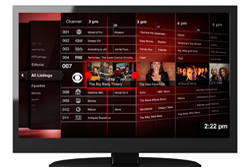Europe's online source of news, data & analysis for professionals involved in packaged media and new delivery technologies

Content overload makes electronic programme guides critical
Thousands of TV programmes, catch-up TV video-on-demand archives, internet-TV services, video-sharing platforms and personal content currently compete for audiences. With such a huge range of content, the electronic programme guide (EPG) is being promoted to the increasingly important role of an entertainment guide for content-overloaded digital living rooms.
That's according to the report EPGs and TV Middleware Applications: Market Assessment and Forecasts to 2014. The report, a collaboration between media analysts Screen Digest and consulting firm Goldmedia, is supported by Presse-Programm-Service GmbH, one of the leading European providers of programme information.
Some 59 million households in Western Europe were equipped with EPGs at the end of 2008, a penetration of 36% of all TV households. This number will grow 19% yearly between 2008 and 2014 so that nearly three quarters of all TV households will have access to EPGs in 2014.
The report has identified about 300 EPGs on the different platforms in Western Europe. These include EPGs in set-top boxes from pay-TV and infrastructure providers, online EPGs from TV guide magazines, TV platform providers, online providers and mobile EPGs.
2008 the EPG market volumes from direct revenues in Western Europe amounted to about €156m. According to Goldmedia and Screen Digest forecasts, these revenues will nearly triple by 2014 to €451m.
Direct EPG revenues primarily come from B2B transactions: from technical development, implementation of EPGs in end devices, licenses, software and programme updates. In addition the EPG is rapidly gaining significance as a transaction, advertisement and communication platform. As the gateway to viewers, the EPG is becoming both an interactive advertising medium and a sales portal for pay-TV and other content providers.
The progress of development differs by country and corresponds closely to the digitization process of the TV infrastructure. The spread of pay-TV and IPTV, the degree of innovation among cable network operators and the proliferation of end devices with specific EPGs are essential factors in development.
The UK has been the most developed and innovative EPG market in Western Europe to date. Seventy percent of UK TV households already have EPGs. The Sky Guide from British pay-TV market leader BSkyB is the most widespread EPG in Western Europe, with over nine million users. Cable network operator Virgin Media also offers customers access to the BBC iPlayer via its EPG in a hybrid set-top box.
The Scandinavian market has a large number of high grade and innovative EPGs. In France, Europe's leader for IPTV distribution, EPGs are well represented on the platform. EPG penetration in Italy is relatively high at 38% where the market benefits primarily from government subsidies for DTT boxes and the promotion of the interactive standard MHP. Germany lags behind many other countries in Europe, primarily because of the relatively low penetration of digital and pay-TV.
A large number of players operate in the EPG market, covering various areas of the value chain: content providers; TV platform operators; middleware, application and end-device vendors. A variety of companies are responsible for the development, implementation, and maintenance of EPGs, including technical service and programme data providers.
"The EPG is becoming much more than a digital programme guide: it is evolving into an interactive, personalized and integrated entertainment guide," says Mathias Birkel, senior consultant at Goldmedia and author of the report. "Whether on the television, the internet or mobile, the EPG of the future locates content that is of interest for the specific user. Not only will it offer automatic recommendations - either personal TV channels or personalized programme tips – but it will also include suggestions from friends, and from customers with similar interests from sites like Facebook."
Story filed 02.03.10




















